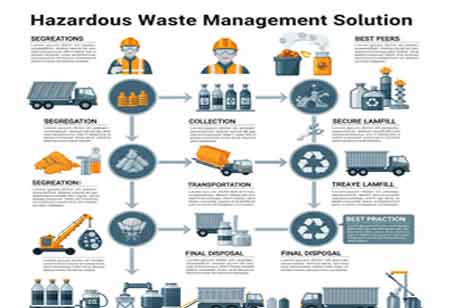Thank you for Subscribing to Environmental Business Review Weekly Brief
AI's Role in Advancing Climate Data Solutions in Europe
AI is revolutionising climate data collection and analysis, enhancing Europe's ability to monitor and address climate change challenges.

By
Environmental Business Review | Tuesday, October 07, 2025
Stay ahead of the industry with exclusive feature stories on the top companies, expert insights and the latest news delivered straight to your inbox. Subscribe today.
Fremont, CA: Climate change is an increasingly urgent issue, with far-reaching consequences for ecosystems, economies, and societies. In response to this challenge, Europe is exploring innovative technologies that can enhance climate monitoring and decision-making. One of the most promising advancements is the use of artificial intelligence (AI) to improve the collection and analysis of climate data. By leveraging AI, researchers and policymakers can gain deeper insights into climate trends, refine predictive models, and implement more targeted strategies for mitigating and adapting to climate change. AI is becoming an indispensable tool for addressing climate-related challenges and shaping sustainable futures.
Optimising Climate Data Collection
By increasing the effectiveness and precision of data collection, artificial intelligence (AI) greatly tackles the difficulties facing climate research. Traditional methods are resource-intensive and error-prone, while AI automates the aggregation and processing of environmental data from various sources like satellites and sensors. This automation accelerates data acquisition, minimises manual intervention, and enhances dataset reliability by filtering noise and identifying patterns. As real-time monitoring becomes increasingly vital, AI's capacity to quickly process and analyse data is essential for effectively tracking climate changes, including temperature variations and rising sea levels.
Enhancing Predictive Climate Models
AI's impact on predictive climate modelling is one of its most significant contributions to climate science. By analysing vast datasets over time, AI can identify correlations and trends that may be difficult for traditional models to detect. These insights help refine predictive models, allowing scientists to forecast future climate conditions with greater accuracy and detail.
AI-driven models in Europe help simulate climate scenarios, informing strategies for adaptation and mitigation by assessing the impacts of emissions and policy changes. These models support agricultural planning, disaster preparedness, and urban development, enabling proactive policymaking through accurate predictions.
Supporting Policy and Decision-Making
As climate data becomes increasingly complex and dynamic, decision-makers require sophisticated tools to interpret and act on the information. AI's ability to process large datasets in real time allows for quicker, more informed decision-making processes. In Europe, this is particularly important for crafting policies that address the immediate and long-term impacts of climate change.
AI-powered platforms can assist policymakers by providing real-time insights into emerging climate trends, tracking the effectiveness of existing policies, and even simulating the outcomes of potential policy changes. This data-driven approach enables more adaptive and flexible policy frameworks, which are crucial in a world where climate change impacts are increasingly unpredictable. By integrating AI into climate policy, Europe can ensure that its strategies remain responsive, effective, and aligned with global sustainability goals.





